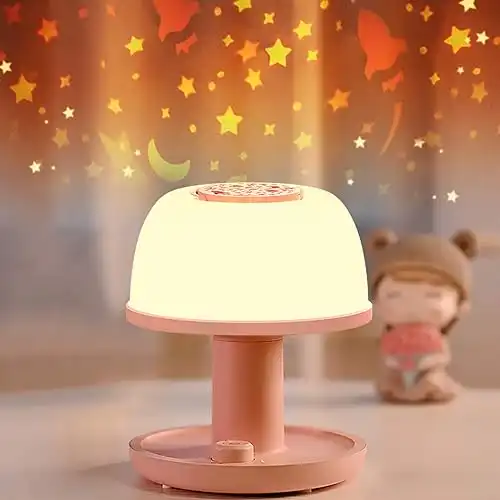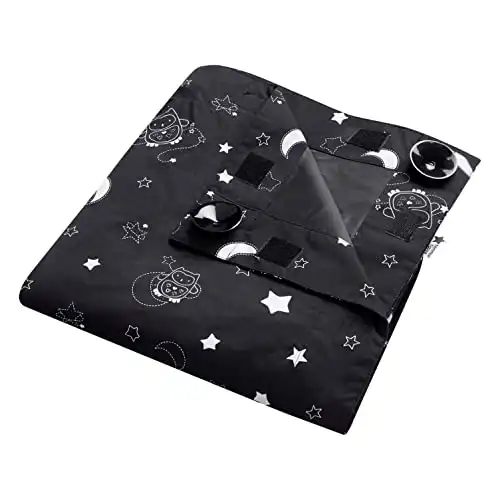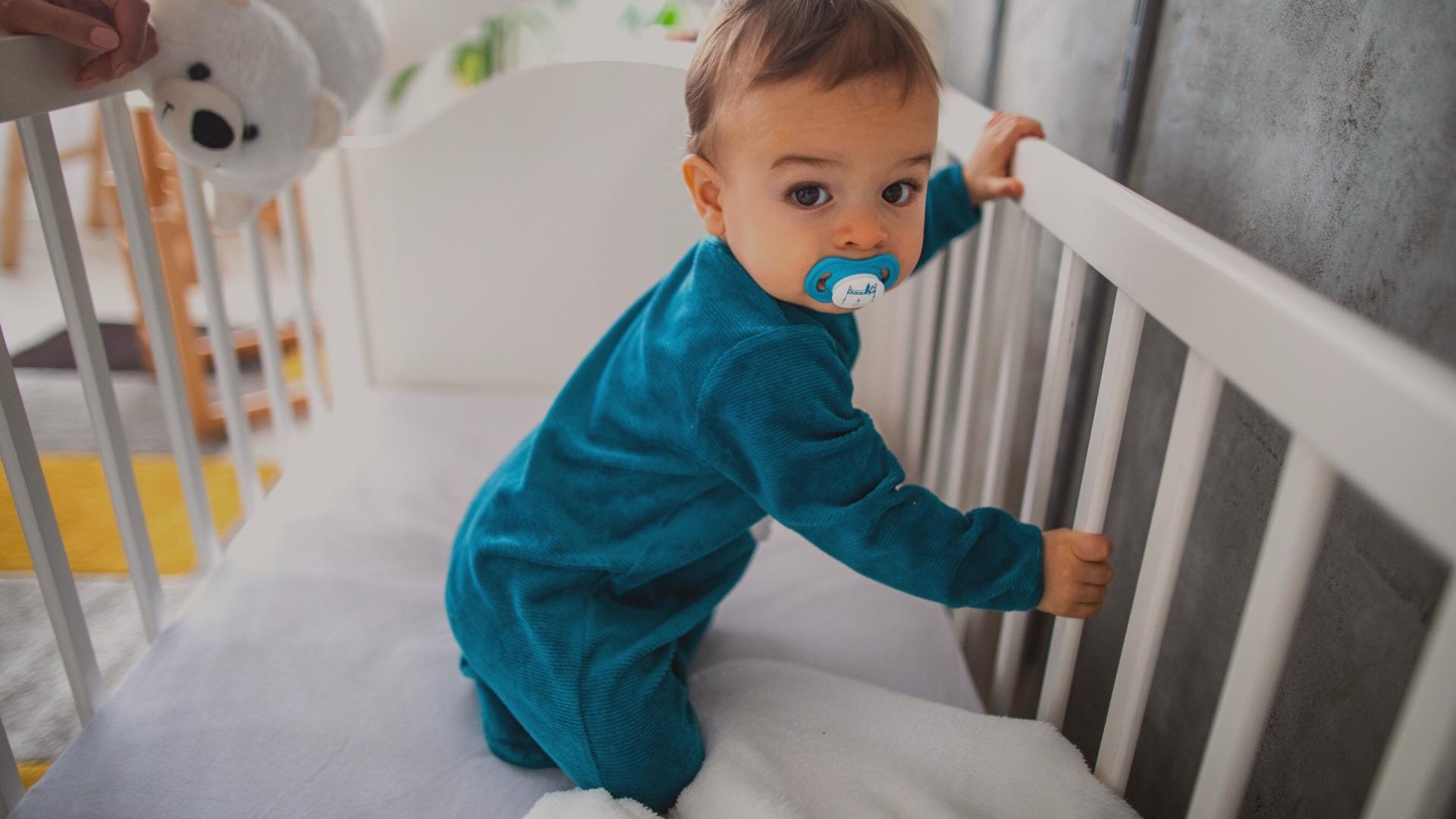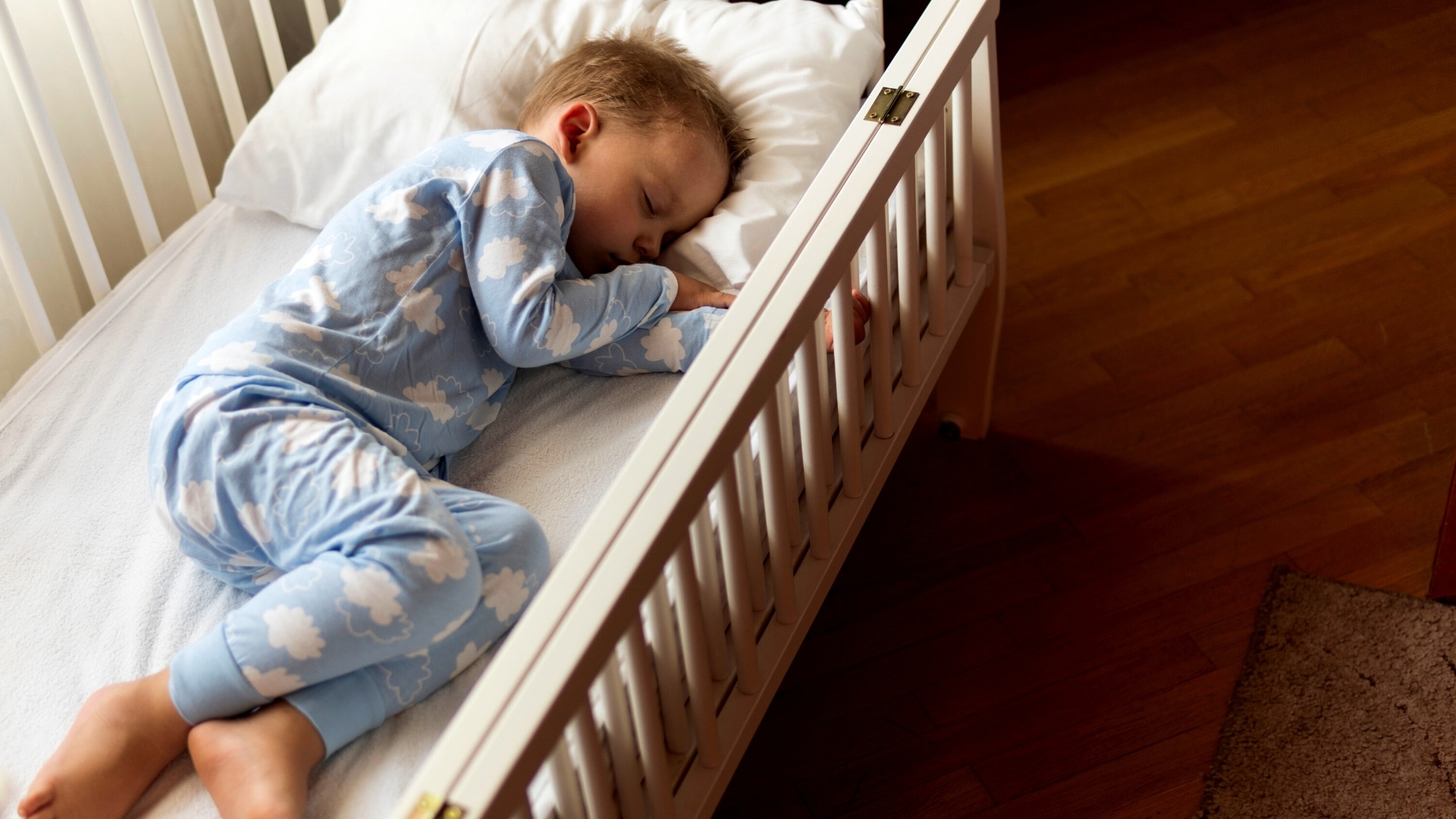Baby suddenly fighting sleep? Being fussy? Struggling to settle? The 5 month sleep regression has arrived. Here’s what that means, and what exhausted parents need to know to get through it.
What Is The 5 Month Sleep Regression?
The 5 month sleep regression is defined as a period of time in which your baby’s sleep pattern becomes disrupted by them fighting sleep, waking more often and struggling to fall back to sleep. They may also be more clingy than normal. The 5 month sleep regression falls between two of the most recognised sleep regressions at 4 months and 6 months.
How Long Does The 5 Month Sleep Regression Last?
The 5 month sleep regression, like all sleep regressions, commonly lasts between 2 and 6 weeks depending on the trigger.
What Causes A 5 Month Sleep Regression?
The first sleep regression that occurs around 4-5 months of age is slightly different from regressions that occur when your child is older because it’s more defined in its cause and is usually driven by one of the following reasons:
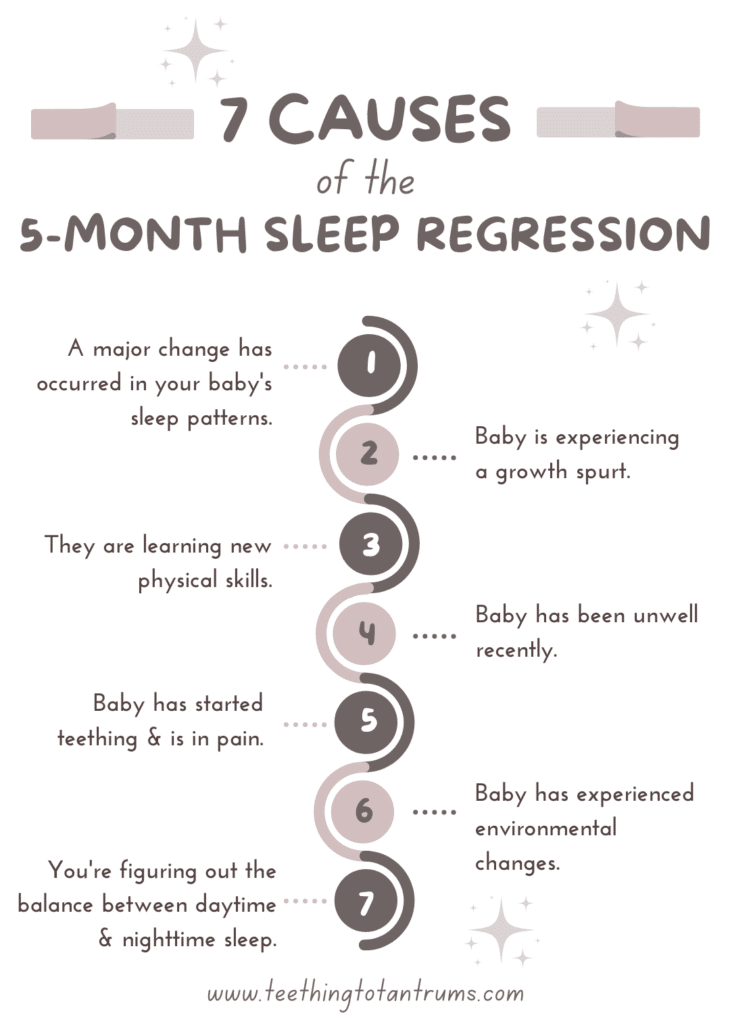
- A major change has occurred in your baby’s sleep patterns. At around 5 months of age, parents are often trying to consolidate baby’s sleep at night. They may be sleeping for longer periods at night and not needing so many night feeds. This can all lead to a period of time when your little one may struggle to adjust to not being fed when they wake up and having to resettle again.
- They are experiencing a growth spurt. If your little one is going through a growth spurt it may disrupt their natural and established sleep cycle for a short time as they are using more energy to grow or are becoming restless.
- They are learning new physical skills. At 5 months of age your little one is continuing to learn a lot about the world around them, they are more vocal, constantly putting things into their mouths, pushing up on their arms, and rolling over. All of this development and stimulation can result in them struggling to fall asleep and stay asleep as their brain and body adjust to all this new information.
- Your baby has been ill. Should your little one be unwell this can also disrupt their sleep routine for a while as their normal routine is flipped upside down.
- Teething. Although this is quite early some babies can start teething at this age. The pain and discomfort associated with teething can start to disrupt sleeping patterns and trigger a sleep regression.
- There have been environmental changes. A change to their sleep associations, moving house, travelling with your baby or staying over at Granny’s can all trigger a regression.
- You’re figuring out the balance of daytime and nighttime sleep. Sometimes getting the balance between naps and nighttime sleep wrong can throw off your baby’s sleep pattern and circadian rhythm which can trigger a sleep regression. As your baby grows, constant changes are taking place with nighttime sleep and daytime sleep.
NOTE: The Sleep Foundation explains that a sleep regression at 5 months occurs because ‘babies are in the midst of a major transition away from a newborn sleep pattern. That transition is not always smooth; it may have plateaus or setbacks.’ As a result, your baby will now spend more time in light sleep (also known as non-REM sleep) instead of deep sleep which causes more frequent waking.
5 Month Sleep Regression Signs
For some children a 5 month sleep regression is obvious, but for others, there are some subtle signs that indicate your little one is entering a regression. Signs to look out for include:
- Baby has difficulty falling asleep. If your baby has finally started to fall asleep nicely and then starts to regress to resisting sleep and struggling to settle then it is very likely they have hit their first sleep regression.
- Baby is more restless and fussing when waking. Because a sleep regression results in less deep refreshing sleep your little one may wake in a grumpy mood and be rather fussy and unsettled.
- There are more nighttime wakings and naps are shorter. As with finding it more difficult to fall asleep, it is typical during a sleep regression due to the change in their sleep pattern for your baby to wake more often at night. This may also affect how long they stay asleep during the day.
- Your baby is more alert and interested in their surroundings. As with learning a new skill, developing an interest in their surroundings means your little one’s brain is being very stimulated and may struggle to wind down for sleep.
- Your baby is learning new skills. If your baby has started to roll over and is babbling more and reaching for objects this will stimulate their brain and body to the point that they find it difficult to unwind at naptime and bedtime. You may even find that they roll over in their sleep and this wakes them.
- They are more clingy. At around 5 months of age, your little one will definitely be more aware of their surroundings and more attached to those that care for them. This can result in them being more clingy and not liking being left alone especially when it is time to sleep.
Looking to get your little one to sleep quickly and effortlessly? Check out my Bedtime and Nap Cheat Sheet and master the art of making daytime naps and bedtimes as seamless as possible.
A bedtime & nap cheat sheet so good your little one will ask you to put them to bed...
Laura Williams "This is a life saver! I'm so glad I downloaded your bedtime & nap cheat sheet. My little one actually asked me to put him to bed last night! Unbelievable! Thank you so much!"
Click Here For The FREE Cheat Sheet
Tips To Manage The 5 Month Sleep Regression
Navigating a sleep regression is no easy task, but fortunately, there are some tried and tested tips to help you get through the 5 month sleep regression as quickly and easily as possible:
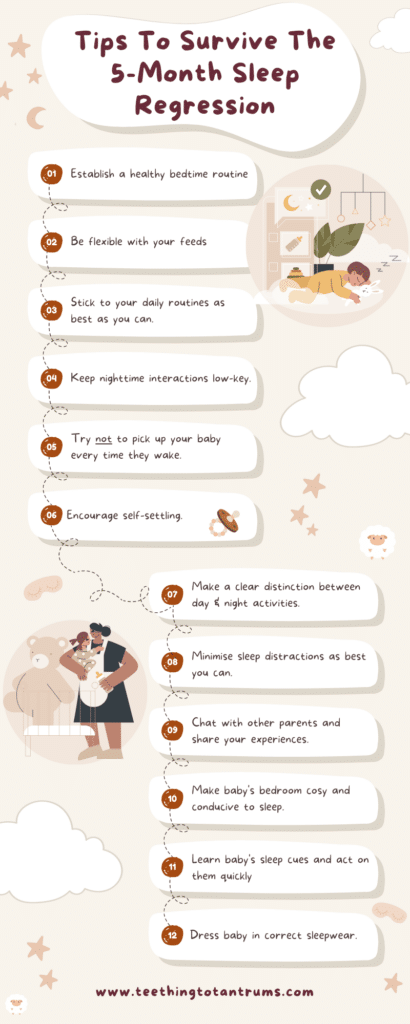
1. Establish A Healthy Bedtime Routine
As your baby’s circadian rhythm linked to melatonin secretion (which is also provided through breastmilk) starts to settle into a more regular cycle… if you have not done so already 5 months is an ideal age to start a more structured nap, play and bedtime routine.
Having healthy sleep habits will make it easier for you to cope when your baby decides to fight sleep.
Ensuring your baby gets consistent cues in preparation for sleep by lowering the energy levels, getting into a cosy bedroom, reading a bedtime story and following the same consistent bedtime routine will give them all the right signals that sleep is on the way.
TOP TIP: If you only have one routine that you live religiously by… make it the bedtime routine. After all… everything revolves around sleep. And if baby is well rested, they will take everything else in their stride.
2. Be Flexible With Feeds
It is very tempting to feed your baby in order to get them back to sleep… however, this is not a habit you want to continue. Therefore, if your baby is experiencing a growth spurt your baby may naturally become more hungry.
Try introducing a dream feed before you go to bed to prevent extra nighttime waking and increase the length of time you breastfeed by a couple of minutes or increase bottle feeds by ½ ounce.
3. Stick To Your Routines
I cannot stress how much maintaining baby’s healthy daily and bedtime routines will help to keep you sane and keep their healthy development on track.
I know life gets in the way sometimes, but being super vigilant about nap times, meal times and bedtimes during a sleep regression will make your life so much easier as baby’s internal clock will recognise the regular schedule and get back into a consistent sleep schedule much sooner.
So, if you have to cancel a few plans over the coming weeks to ensure you’re at home for naps and bedtime, trust me it will be worth it in the long run.
4. Keep Night Time Interactions Low Key
If your little one wakes at night then it’s super important to keep your interactions low-key.
Have the lights down low and do not chat to them.
A night light is a great investment for these nighttime interactions as it stops you from having to turn on any bright lights when visiting them at night.
Finding the right night light for your child can be quite a task. You want something safe, comforting, and practical. The Cozy Starry Night Light ticks these boxes, with eye-friendly warm lighting and an easy-to-use dimmer.
Its gentle glow makes it the best night light for feeding baby, diaper changes, or comforting your little one back to sleep.
As your baby grows the Cozy Starry Night Light's starry sky projection can provide comfort and gentle quiet time stimulation. Its soft lighting ensures a dreamy, peaceful environment, supporting your baby’s natural sleep cycle.
It really is a fantastic nightlight (at a very reasonable price!)
- Eye-friendly warm lighting with adjustable brightness.
- Includes a timer function for convenience.
- Projects a starry sky that is soothing for little ones.
- Rechargeable battery, so it's very portable.
- A USB adapter is not included for charging.
- The star projector is static without motion (however, this is ideal for very young babies and toddlers).
- Battery life varies based on the brightness settings.
5. Try Not To Pick Baby Up Every Time They Wake Up
When it comes to nighttime wakings, try to comfort your baby in the crib rather than picking them up.
Picking your baby up has the association that their sleep is over. This can then lead to difficulties getting them to fall back asleep when you put them back down.
This is especially true if your baby fights sleep during a 6 month sleep regression. Therefore, try gently stroking their head or patting their tummy instead.
6. Encourage Self Settling
If you have not done so already, try and teach your baby to self-settle. Allow them to spend time in their cribs during their awake time and put them down when they are not fully asleep.
And if your baby wakes in the night do not rush in straight away as they may re-settle themselves after a few minutes.
If you’d like to learn more about teaching your baby to self-settle, I have made a quick video explaining it in more detail below.
7. Make A Distinction Between Day And Night Activities
Make sure your little one makes the most of their day. Keep busy and get out into the fresh air. Encourage your baby to be engaged in different types of play and explore their world.
Then, about an hour before bedtime, begin to lower the energy levels so your baby learns the sleep cue that bedtime is approaching.
8. Minimise Sleep Distractions
Sleep distractions can be anything from dogs barking; post arriving; dropping a plastic tub on the floor or changes to their surroundings.
Your little one needs to be sleeping in a calm, dimly lit room ESPECIALLY when going through a six-month sleep regression. Some parents like to use a white noise sound machine and I am a huge advocate of them.
White noise machines will help to ensure that sudden changes in noise will have less of an impact on your sleeping baby which will mean you do not have to panic if you accidentally drop the TV remote!
White noise machines are a game-changer for your little one's sleep and having one that plays all night is a must. With a long-lasting battery, this compact and stylish white noise machine contains 21 non-stop relaxing noises, which will lull your little one to sleep night after night, no matter where you are!
REMEMBER: It’s important for babies to learn to fall asleep in different locations and to different noises, but when they’re going through a 6 month sleep regression… keep things as simple as possible and encourage baby to sleep in the same safe sleep space every time.
9. Chat To Other Parents And Share Your Experience
Sharing is a great way to help you through a 6 month sleep regression. Knowing you are not alone or that others have been through the same thing will be very comforting and give you reasonable expectations about when to expect your little one to sleep through the night again.
Do a quick Google search, talk to your paediatrician or talk to your local daycare to see if there are any groups in your local area who can help you connect with other parents.
10. Make Baby’s Sleep Space More Conducive To Sleep
As your baby becomes more alert they will lose the newborn’s ability to sleep anywhere… So, darken the bedroom using blackout blinds and use a nightlight to make a cosy sleep space.
Finding the right night light for your child can be quite a task. You want something safe, comforting, and practical. The Cozy Starry Night Light ticks these boxes, with eye-friendly warm lighting and an easy-to-use dimmer.
Its gentle glow makes it the best night light for feeding baby, diaper changes, or comforting your little one back to sleep.
As your baby grows the Cozy Starry Night Light's starry sky projection can provide comfort and gentle quiet time stimulation. Its soft lighting ensures a dreamy, peaceful environment, supporting your baby’s natural sleep cycle.
It really is a fantastic nightlight (at a very reasonable price!)
- Eye-friendly warm lighting with adjustable brightness.
- Includes a timer function for convenience.
- Projects a starry sky that is soothing for little ones.
- Rechargeable battery, so it's very portable.
- A USB adapter is not included for charging.
- The star projector is static without motion (however, this is ideal for very young babies and toddlers).
- Battery life varies based on the brightness settings.
Maintaining a good sleep routine with your baby can be tricky, especially through changing seasons or when you’re away from home! This beautiful blackout blind from Tommee Tippee is made from lightweight premium fabric and completely blocks out daylight, helping to create a dark and sleepy space for baby, no matter where you are!
11. Learn Your Baby’s Sleep Cues And Act On Them
During a sleep regression your baby may need more daytime sleep to make up for broken nights so keep a keen eye on their sleep cues and act on them.
Increased physical activity and ability can make your little one more tired than usual for a while. As they adjust to their new skills you will need to keep a close eye on sleep cues to avoid having to deal with an overtired baby.
12. Dress Your Baby In The Correct Sleep Gear
Many babies of this age will no longer sleep well if swaddled. If your baby has started to roll over you should stop swaddling them, Moving to a weighted sleeping bag or using a transition swaddle can help with enabling your baby to sleep more peacefully and comfortably.
Another great sleepwear range with sleeping bags to suit all ages and seasons. The easy to follow tog guide used in conjunction with the GroEgg room thermometer will give you peace of mind that you have chosen the perfect sleep attire for your little one.
Frequently Asked Questions About The 5 Month Sleep Regression
Looking for more information about the 5 month sleep regression? Check out the most commonly asked questions here.
Does The 5 Month Sleep Regression Affect Naps?
Yes, the 5 month sleep regression may affect naps and nap schedules. This is because if your little one has not had sufficient sleep during the night… they will need extra sleep during the day.
You may also find that your baby sleeps for less time during their naps, so they will require more of them.
Do All Babies Experience A 5 Month Sleep Regression?
No, not all babies will experience a 5 month sleep regression.
They may have already had a sleep regression when they were adjusting to moving from a newborn sleep pattern to an older baby sleep pattern where they wake more often and more easily. Or they may have missed that regression and are now experiencing one for the first time due to any of the reasons listed above.
Why Is My 5 Month Old Suddenly Not Sleeping?
If a baby has been sleeping beautifully and suddenly has more night wakings and resisting sleep in general this usually means they have hit a sleep regression.
This can be due to a number of triggers including a growth spurt or achieving a developmental milestone.
While you should always rule out any illness that may be affecting your little one if all is well then you should deal with your little one’s nighttime waking as a sleep regression and follow the tips listed above.
What Time Should A 5 Month Old Go To Bed?
Most 5 month old babies should have a regular bedtime of between 6-8pm. I usually aim for a 7pm bedtime but you can adjust bedtimes accordingly depending on your family routine and how much daytime sleep your little one is having.
Why Is My 5 Month Old Sleeping Like A Newborn Again?
If your 5 month old needs more hours of sleep it could be because they have just come out of sleep regression and are catching up on some much-needed sleep once a growth spurt or developmental milestone has passed.
This is quite common at 5 months if they have gone through a regression at 3-4 months.
There is always the chance that your little one is a baby who sleeps more when going through a growth spurt or learning a new skill during the day.
As always each child is different and it is important to be aware of this when dealing with sleep regressions at any age.
When Do I Need To Talk To A Doctor About The 5 Month Sleep Regression?
If you are unsure if your baby’s change in sleep patterns is due to a sleep regression… watch for the following signs. If they are present then you should consult a doctor as they may be indicators of an underlying issue:
- Your baby has abnormal breathing or is snoring during sleep
- Your baby is not gaining weight.
- Your baby is eating less.
- Your baby is having fewer than 4 wet diapers and 3 bowel movements a day.
- General lethargy or weakness
TOP TIP: You know your baby better than anyone else so if you are concerned that your baby’s sleep issues are more than just a regression, then seek medical advice and have a chat with a sleep consultant or your medical practitioner or paediatrician.
Further Reading
If you would like to learn more about sleep regressions and how to handle them at different ages, check out these posts:
- Sleep Regression: What, Why, Signs & Sanity-Saving Solutions
- 4-Month Sleep Regression
- 6-Month Sleep Regression
- 8-Month Sleep Regression
- 12-Month Sleep Regression
- 18-Month Sleep Regression
- 2-Year Sleep Regression

Need More Parenting Help?
- Download our FREE Perfect Sleep Cheat Sheet. It’s a free, easy-to-use and proven formula designed for parents of 0-5 year olds to master the art of consistently undisturbed and restful sleep without the yelling, nagging or exhausting long-winded evenings.
- Check out our Parenting Toolbox. You’ll get access to expertly-chosen products that you can guarantee are the best for your little one and your wallet.
- Ready to create the calm, peaceful evenings you deserve? Then checkout our most popular course - The Bedtime Battles Masterclass

A bedtime & nap cheat sheet so good your little one will ask you to put them to bed...
Laura Williams "This is a life saver! I'm so glad I downloaded your bedtime & nap cheat sheet. My little one actually asked me to put him to bed last night! Unbelievable! Thank you so much!"
Click Here For The FREE Cheat Sheet
